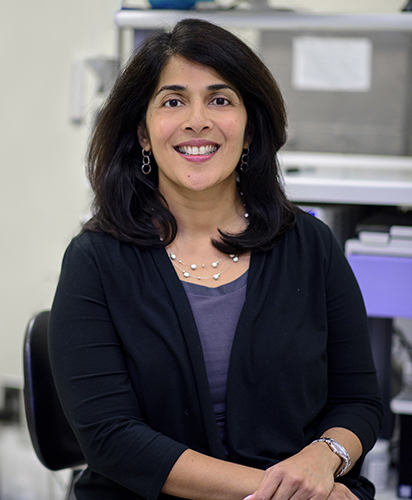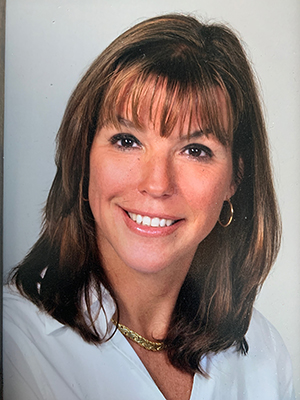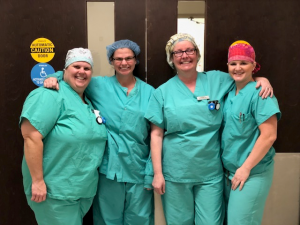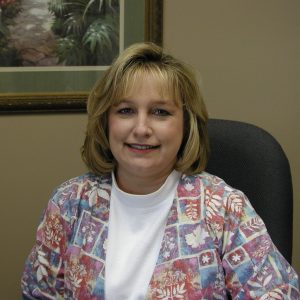From lower costs and attentive care to a reduced risk of hospital-acquired infections and at-home recovery, there are many benefits for patients who have total joint replacements in the ambulatory surgery center setting. The team at Blue Water Surgery Center in Port Huron, Michigan, recently completed its first total joint procedure, preparing the center to offer these benefits to patients in the market.
“We discussed performing total joint procedures at the center for years. We worried that the population in our market would not want to have such procedures at an ASC,” explained Karen Squires, Center Leader at Blue Water Surgery Center. “One of our doctors began exploring his cases and encouraging the team to investigate what would be needed to make the surgeries happen in our center.”
After exploration, the center staff took a year and a half to fully prepare to bring total joints to the center. During the preparation time, the center staff completed the large amount of due diligence needed to successfully complete their first knee replacement surgery.
Blue Water’s commitment to ensure the first total joint procedure was a success was evident in the amount of preparation the center completed. The team conducted a full run-through of the procedure to rehearse, prepare and ensure everything went as planned. The entire staff, clinicians and support roles, were engaged and invested in the process. “Each member of the team brought positive energy to this initiative. It was truly a team effort,” added Karen.
The Total Joints Toolkit is a helpful resource the center used in the preparation process as well. “We did not reinvent the wheel but used all of the resources around us to ensure we had a safe and successful outcome for our patient. There were templates and best practices from other centers in the network at our disposal.”
“We worked with the vendors, our AMSURG Materials Manager Bryan Wolf, our Operations Lead Linda White and the Total Joints Coordinator Troy Sparks to ensure we were fully prepared and resourced,” Karen said. “Our vendors and ASMURG were helpful and supportive from start to finish.”
One of the key elements of adding total joint procedures at the ASC is identifying the right patients. Generally, younger, healthy patients with the right ensure make for the best candidates. Active lifestyles are also an important factor in having the procedure completed in the ASC. “Our first procedure, a knee replacement, took a total of three hours with great pain management. Our patient was also able to manage pain well at home.”
With one successful procedure complete, Blue Water plans to explore bringing more total joints procedures into the center. “We definitely want to get a few more procedures under our belt before we begin marketing the procedures at the center,” explained Karen, “Our goal is to expand our work in spine and total joints. We have also implemented a study for multimodal pain management.”
“I have been the Center Leader since 2006 and have always said total joints would never happen … in 2019, my biggest lesson and reminder is to never say never,” Karen concluded.

 The career paths of successful surgeons are not always the same. Marwa A. Adi, M.D., FACS had to work harder to complete her training in ophthalmology, but her unique path has made her one of the most sought-after corneal specialists on the east coast.
The career paths of successful surgeons are not always the same. Marwa A. Adi, M.D., FACS had to work harder to complete her training in ophthalmology, but her unique path has made her one of the most sought-after corneal specialists on the east coast. Geetanjali Akerkar, M.D., AGAF, describes herself as a compassionate healer, lifelong learner and strong advocate for her patients. A gastroenterologist who specializes in liver disease, inflammatory bowel disease and irritable bowel syndrome and a dedicated mother of three, Dr. Akerkar is the chief financial officer of Digestive Health Specialists and president of Lowell Anesthesia. She is also a founding member of Northeast Endoscopy and sits on the board of directors. Dr. Akerkar has an appointment at Harvard Medical School and serves on the board of the Massachusetts Gastroenterology Association. “Medicine allows me to utilize several strengths at once,” she said. “It requires quick analysis and interpersonal skills.” She is particularly passionate about gastroenterology (GI) because she treats patients of all ages and a diverse range of conditions including infections, autoimmune diseases and cancer. “I have to think of the whole body because symptoms could represent disease in other organ systems outside the GI tract.” In other words, gastroenterology keeps her on her toes. Excellence in GI Care Dr. Akerkar’s patients say she is a gifted communicator, a quality she honed many years ago while on the competitive debate team at Cornell University. “Patients tell me I explain things well and that I’m compassionate and direct,” she shared. These qualities are essential in a physician, especially when delivering difficult news like a cancer diagnosis. “My compassion gives patients hope, and the directness gives a sense of urgency to move forward with treatment.” Providing excellent care is one of many reasons Castle and Connolly named Dr. Akerkar a Boston Top Doctor for the third year in a row. This honor motivates her to offer cutting-edge technology to her patients. “Medicine and gastroenterology are moving targets,” Dr. Akerkar said. Ongoing training allows me to provide my patients with a wide variety of therapy options as well as the most current treatments.” Most recently, Dr. Akerkar trained to learn a procedure called Barrx, a new radiofrequency ablation treatment for Barrett’s esophagus. A strong advocate for her patients in the Greater Boston area, Dr. Akerkar explained, “My mission is to provide the best local care to my patients and the best access to tertiary centers. Because I’ve lived in Boston for 20 years, I have the connections to get patients with rare conditions to the right facility for complicated surgeries.” Being a Female Physician Leader Several women played a key role in mentoring and encouraging Dr. Akerkar on her path to becoming a female physician leader. Teresa Wright, M.D., head of liver disease at the University of California San Francisco and president of the American Association for the Study of Liver Diseases, mentored her as a GI fellow and invited her to co-write and publish. Doree Barton, M.D., founder of Digestive Health Specialists, provided an example of strong female leadership and dedication to quality patient care. Dr. Akerkar is currently the only female in her practice group, and she attributes the mutual respect among the physicians regardless of gender to Dr. Barton’s pioneering efforts on behalf of female physicians. Dr. Akerkar said she feels privileged to dedicate her time to support the professional growth of other female physician leaders. The American Gastroenterological Association hosted a Women’s Leadership Initiative, and Dr. Akerkar participated in its inaugural year by working collaboratively to improve gender equality and to foster sponsorship and mentorship among GI physicians. She recently accepted an invitation to serve on the President’s Council of Cornell Women where she will promote advancement of female faculty and students. Women are still underrepresented in gastroenterology and other procedural and surgical specialties, but Dr. Akerkar sees this as an advantage. “Many women shy away from procedural or surgical specialties because of the call schedule. While the training process is more rigorous, these fields seek women and therefore, present unique opportunities. Before she joined Digestive Health Specialists, Dr. Akerkar took time off to be at home with her twins until they were a year old. Because she was well-trained, she was confident in her ability to return to a full-time position. Her practice prioritizes family, and she has tried not to miss sports games and concerts. “I tell my female mentees, ‘If you have a passion for a specialty, go for it. When you are one of few, you actually have more control over your schedule.’” Young female physicians must be heeding her advice because women will comprise about half of the next generation of GI fellows. Dr. Akerkar is amused by the tangible evidence of this change – as she sees the line for the women’s restroom growing longer every year at annual GI meetings.
Geetanjali Akerkar, M.D., AGAF, describes herself as a compassionate healer, lifelong learner and strong advocate for her patients. A gastroenterologist who specializes in liver disease, inflammatory bowel disease and irritable bowel syndrome and a dedicated mother of three, Dr. Akerkar is the chief financial officer of Digestive Health Specialists and president of Lowell Anesthesia. She is also a founding member of Northeast Endoscopy and sits on the board of directors. Dr. Akerkar has an appointment at Harvard Medical School and serves on the board of the Massachusetts Gastroenterology Association. “Medicine allows me to utilize several strengths at once,” she said. “It requires quick analysis and interpersonal skills.” She is particularly passionate about gastroenterology (GI) because she treats patients of all ages and a diverse range of conditions including infections, autoimmune diseases and cancer. “I have to think of the whole body because symptoms could represent disease in other organ systems outside the GI tract.” In other words, gastroenterology keeps her on her toes. Excellence in GI Care Dr. Akerkar’s patients say she is a gifted communicator, a quality she honed many years ago while on the competitive debate team at Cornell University. “Patients tell me I explain things well and that I’m compassionate and direct,” she shared. These qualities are essential in a physician, especially when delivering difficult news like a cancer diagnosis. “My compassion gives patients hope, and the directness gives a sense of urgency to move forward with treatment.” Providing excellent care is one of many reasons Castle and Connolly named Dr. Akerkar a Boston Top Doctor for the third year in a row. This honor motivates her to offer cutting-edge technology to her patients. “Medicine and gastroenterology are moving targets,” Dr. Akerkar said. Ongoing training allows me to provide my patients with a wide variety of therapy options as well as the most current treatments.” Most recently, Dr. Akerkar trained to learn a procedure called Barrx, a new radiofrequency ablation treatment for Barrett’s esophagus. A strong advocate for her patients in the Greater Boston area, Dr. Akerkar explained, “My mission is to provide the best local care to my patients and the best access to tertiary centers. Because I’ve lived in Boston for 20 years, I have the connections to get patients with rare conditions to the right facility for complicated surgeries.” Being a Female Physician Leader Several women played a key role in mentoring and encouraging Dr. Akerkar on her path to becoming a female physician leader. Teresa Wright, M.D., head of liver disease at the University of California San Francisco and president of the American Association for the Study of Liver Diseases, mentored her as a GI fellow and invited her to co-write and publish. Doree Barton, M.D., founder of Digestive Health Specialists, provided an example of strong female leadership and dedication to quality patient care. Dr. Akerkar is currently the only female in her practice group, and she attributes the mutual respect among the physicians regardless of gender to Dr. Barton’s pioneering efforts on behalf of female physicians. Dr. Akerkar said she feels privileged to dedicate her time to support the professional growth of other female physician leaders. The American Gastroenterological Association hosted a Women’s Leadership Initiative, and Dr. Akerkar participated in its inaugural year by working collaboratively to improve gender equality and to foster sponsorship and mentorship among GI physicians. She recently accepted an invitation to serve on the President’s Council of Cornell Women where she will promote advancement of female faculty and students. Women are still underrepresented in gastroenterology and other procedural and surgical specialties, but Dr. Akerkar sees this as an advantage. “Many women shy away from procedural or surgical specialties because of the call schedule. While the training process is more rigorous, these fields seek women and therefore, present unique opportunities. Before she joined Digestive Health Specialists, Dr. Akerkar took time off to be at home with her twins until they were a year old. Because she was well-trained, she was confident in her ability to return to a full-time position. Her practice prioritizes family, and she has tried not to miss sports games and concerts. “I tell my female mentees, ‘If you have a passion for a specialty, go for it. When you are one of few, you actually have more control over your schedule.’” Young female physicians must be heeding her advice because women will comprise about half of the next generation of GI fellows. Dr. Akerkar is amused by the tangible evidence of this change – as she sees the line for the women’s restroom growing longer every year at annual GI meetings. Nathalie C. Rioux, M.D., FRCS, is passionate about improving diversity in medicine.
Nathalie C. Rioux, M.D., FRCS, is passionate about improving diversity in medicine. The physicians and staff at Orthopaedic Surgery Center of Ocala are committed to providing safe, high-quality, evidence-based care. As part of the center’s patient-centered approach, the team does not administer a spinal nerve block prior to surgery. Instead, they apply local anesthesia to the joint, which results in shorter recovery time and can have patients out the door within two hours after surgery.
The physicians and staff at Orthopaedic Surgery Center of Ocala are committed to providing safe, high-quality, evidence-based care. As part of the center’s patient-centered approach, the team does not administer a spinal nerve block prior to surgery. Instead, they apply local anesthesia to the joint, which results in shorter recovery time and can have patients out the door within two hours after surgery. It is not common these days to meet an individual who has worked with the same company for 30 years. Cindy Sease, registered nurse, is not your common center leader. She has worked at the Columbia Gastrointestinal Endoscopy Center since the doors first opened in November 1988. “Working for the same center has allowed me the opportunity to master my job. That doesn’t mean I don’t make mistakes. It means that I have had the time to learn, experience and continue to grow in my field, which makes me enjoy and appreciate the work I do.”
It is not common these days to meet an individual who has worked with the same company for 30 years. Cindy Sease, registered nurse, is not your common center leader. She has worked at the Columbia Gastrointestinal Endoscopy Center since the doors first opened in November 1988. “Working for the same center has allowed me the opportunity to master my job. That doesn’t mean I don’t make mistakes. It means that I have had the time to learn, experience and continue to grow in my field, which makes me enjoy and appreciate the work I do.”